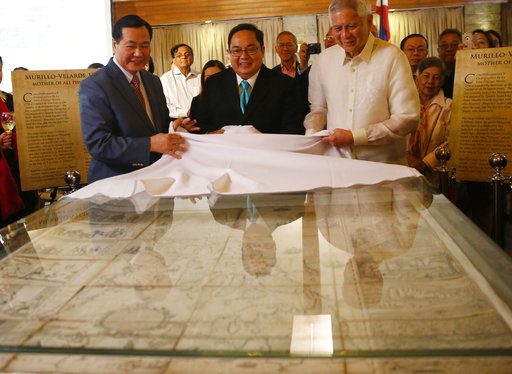Carpio thankful Locsin cleared up Duterte gab on arbitral ruling

From left, Supreme Court Senior Associate Justice Antonio Carpio, Mel Velasco Velarde and former Foreign Affairs Secretary Albert Del Rosario unveil the original copy of the 1734 Murillo-Velarde Map which shows the disputed Spratlys group of islands and the Scarborough Shoal. (AP)
MANILA, Philippines–China could have held President Rodrigo Duterte to his “unilateral declaration” to set aside the Philippines’ 2016 victory at the international arbitral tribunal were it not for Foreign Secretary Teodoro Locsin Jr.’s timely intervention, Supreme Court Senior Associate Justice Antonio Carpio said on Friday.
Locsin’s “prompt clarification” that the Philippines was not setting aside the ruling that upheld the country’s sovereign rights in the West Philippine Sea against China’s expansive claims over nearly the entire South China Sea, averted any dire consequences from Mr. Duterte’s statements, according to the magistrate.
The President told reporters that in a meeting in Beijing early this month, Chinese President Xi Jinping told him to “set aside your claim” and “allow everybody connected with the Chinese companies” to join the exploration for oil and gas, and that China would be “gracious” enough to guarantee the Philippines 60 percent of the revenue.
Legal sense
Mr. Duterte did not say whether he had accepted Xi’s offer.
But he said at a press conference at Malacañang that “the exclusive economic zone is part of the arbitral ruling, which we will ignore to come up with an economic activity.”
Carpio, who was part of the Philippine panel that challenged China’s historical claims in the arbitral court in The Hague, the Netherlands, explained that “in law, to ‘set aside’ a ruling is to abandon, overrule, reverse or annul the ruling.”
“In this legal sense, the President under Philippine law has no authority to ‘set aside’ the arbitral ruling issued by The Hague tribunal,” he said.
“However, even if the President has no authority under Philippine law to set aside the arbitral ruling, the unilateral declaration by the President that he was ‘setting aside’ the arbitral ruling could bind the Philippines under international law under the doctrine of unilateral declarations,” Carpio warned.
‘Prompt clarification’
He said Locsin’s “prompt clarification that the Philippines was not setting aside or abandoning the arbitral ruling, before China could accept the President’s unilateral declaration setting aside the ruling, prevented the Philippines from being bound by the President’s unilateral declaration.”
“We should be thankful to Secretary Locsin for his vigilance in preventing a waiver of our sovereign rights under the arbitral ruling,” the magistrate stressed.
Carpio made the remarks in a series of text messages to reporters on Friday.
Locsin only clarified the President’ statements on Wednesday afternoon after a reporter posed a question on his Twitter account.
Locsin said he read everything Mr. Duterte told President Xi during their talks in Beijing last month and “China has never made setting aside the arbitral award a prerequisite to anything.”
“On the contrary, China agrees with the Philippines to disagree on their respective claims,” Locsin said.
‘Binding, unappealable’
Presidential spokesperson Salvador Panelo said Mr. Duterte “has not abandoned, nor is he abandoning, and neither will he ever abandon the favorable arbitral award issued by the Permanent Court of Arbitration in The Hague, more so with respect to our rights in the West Philippine Sea.”
He pointed out that the President has maintained that the “arbitral ruling is final, binding and unappealable.”
“It is there forever and ever, as in forever. Not only is it carved in stone but it is as permanent as the sun rising on the east,” Panelo said in a statement on Friday.
The ruling affirmed Manila’s sovereign rights over its 370-kilometer exclusive economic zone. “So meaning, it cannot be set aside,” he added.
Focus on mutual benefits
Panelo said he found the “hairsplitting alternate interpretations of President Duterte’s foreign policy” on the maritime dispute “amusing if not exasperating.”
“If there is no force in the meantime in any part of the world that the arbitral ruling can be enforced, neither is there any force on earth that can compel or intimidate the Philippines into abandoning or waiving it,” he said.
Panelo reiterated that the relationship between the Philippines and China did not just concern the maritime dispute.
He said the President “deems it wise and prudent that this kind of relationship should bear fruit by entering into a coproduction, joint venture, or a production-sharing agreement with China that would help us explore, develop or utilize our natural resources in the said maritime area, even as we continue to dialogue peacefully for the resolution of the conflict in the West Philippine Sea.”
Save for appropriate time
Carpio said the President could not set aside the arbitral ruling, but he “can temporarily ‘put aside’ the ruling and assert it at an appropriate future time.”
He said the Philippines must also “officially and promptly protest” whenever China infringed on the country’s sovereign rights “to avoid acquiescing or impliedly consenting to such infringement.”
On Thursday former Foreign Secretary Albert del Rosario, who led the Philippines’ legal challenge against China’s incursions in the West Philippine Sea, said that entering into a joint exploration deal with China should not require the Philippines to give up its legal victory.
“If a service contract arrangement is followed, where a Chinese company participates either as an equity holder or a subcontractor, the President would remain faithful to the Constitution and the arbitral ruling,” Del Rosario said.
For comprehensive coverage, in-depth analysis, visit our special page for West Philippine Sea updates. Stay informed with articles, videos, and expert opinions.